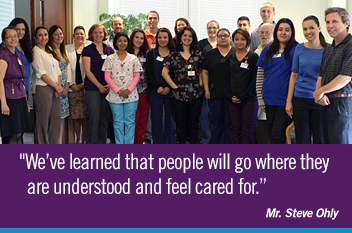An Urban Hub for Preventive Care
 Steve helped launch Walker's Point Community Clinic in a small one-room office about 25 years ago, when Aurora Health Care, a large health care system, recruited him to help care for the homeless and underserved. Since then, the practice has grown into one of the largest community clinics in Wisconsin. Located in a diverse, residential and industrial neighborhood in Milwaukee’s South Side, the clinic is now an important part of the Aurora Health Care system.
Steve helped launch Walker's Point Community Clinic in a small one-room office about 25 years ago, when Aurora Health Care, a large health care system, recruited him to help care for the homeless and underserved. Since then, the practice has grown into one of the largest community clinics in Wisconsin. Located in a diverse, residential and industrial neighborhood in Milwaukee’s South Side, the clinic is now an important part of the Aurora Health Care system.
"Our mission is to be a point of entry to care for people without anywhere else to go, or without many options," says Mr. Steve Ohly, registered nurse practitioner and manager at Walker's Point Community Clinic.
"The health system was looking to open a place where people could get routine care instead of going directly to the emergency room," Steve explains. "We've evolved because we responded to people knocking on the door. We've learned that people will go where they are understood and feel cared for."
For Steve and his team, making sure that patients feel understood is crucial to their success. Patients at Walker's Point come from a wide range of economic and cultural backgrounds, and most patients don't speak English as a first language. Because of this diverse patient mix, having the right communication resources is critical for conveying complex messages about medicine and health. "As we've grown, we've mostly hired people who can speak a second language," says Steve. The clinic also has access to interpretive services through the larger health system to support communication needs.
Walker's Point has evolved quite a bit from its humble beginnings as a one-room clinic for the homeless 25 years ago. Today, the clinic provides primary care services to about 500 patients that they see on an ongoing basis. The clinic is also able to provide preventive screenings for about 1,000 new patients per year, before orienting them to other primary care practices in the area via a "gentle handoff."
"Emphasizing prevention is one way that primary care is changing," Steve says. "In general, health care has been pretty much focused on illness care, but lately we’ve been able to focus more on preventive measures. It's something I'm really excited about."
"If we can find ways to focus consistently on behavior change and support people in finding success with that, we’ll have the biggest bang for our buck."
Steve notes that health coaching is particularly critical and has yielded success in diabetes prevention. "We often see people who are pre-something, like pre-diabetic and just starting to get into bad habits," Steve explains. "We're able to set up situations where they feel cared for and supported in order to make the changes they need. Clinicians will bring up behavior changes that will make patients feel good that very day—and helping patients feel noticeably better is a great way to encourage them to stick with us and stay on track. If we can find ways to focus consistently on behavior change and support people in finding success with that, we’ll have the biggest bang for our buck."
Steve emphasizes that health coaching and preventive services are most effective when patients are open and willing to make changes. His team is focused on finding new ways to encourage behavior change so that preventive care yields long-term results and healthier communities in Milwaukee.
This story is courtesy of Healthy Hearts in the Heartland, the EvidenceNOW Midwest Cooperative.



